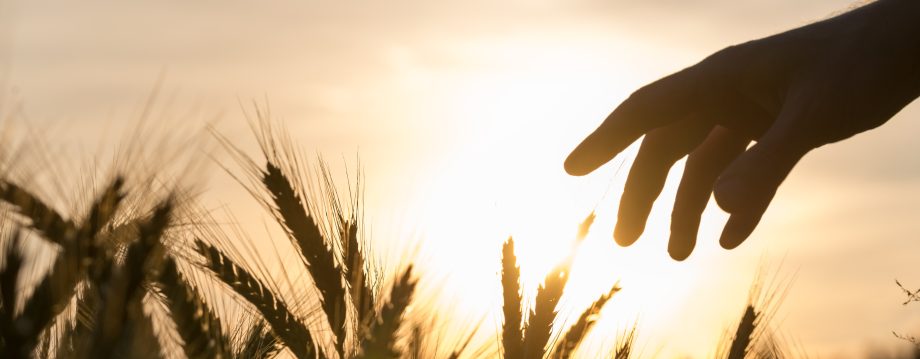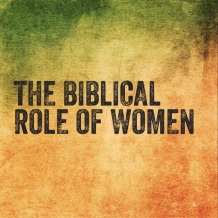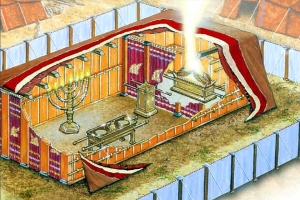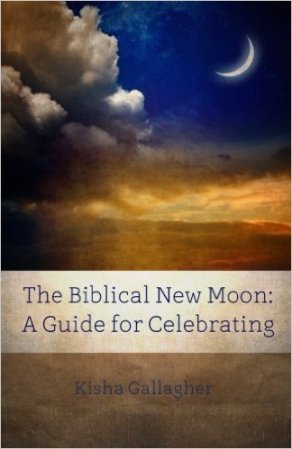Ps. 34:8 (NASB) O taste and see that the LORD is good; How blessed is the man who takes refuge in Him!
The eleventh Hebrew month is called Shevat in Zechariah 1:7. Shevat is a cognate of shevet; meaning branch, rod, scepter, scion, staff, and tribe.[1] In the Land of Israel, Shevat gives the first indicators of spring as the almond trees “wake up” and sprout green buds as a sign of new (resurrected) life. Tu’B’Shevat, the 15th of Shevat, commemorates the New Year for Trees in Jewish tradition. (Read more about that here.)
Almond buds and blossoms are also associated with authority. Consider Aaron’s rod that budded and blossomed overnight with fully ripe almonds after Korah’s rebellion and the consequent plague upon the people. (Num.16-17) This sign (oht) revealed that Aaron was YHWH’s chosen high priest, and that he operated in the fullness of the Holy Spirit, as indicated by the fully ripe fruit on his rod. It wasn’t happenstance that the rod or branch of the almond was chosen to display this sign, as almond trees flower and bear fruit earlier than all the other fruit trees in Israel. Therefore, almonds are שָׁקֵד (sheked) in Hebrew; a word that also means to awake or watch (shakad).
Jer. 1:11-12 (NASB) The word of the LORD came to me saying, “What do you see, Jeremiah?” And I said, “I see a rod of an almond tree.” 12 Then the LORD said to me, “You have seen well, for I am watching over My word to perform it.”
 The imagery of wakefulness, resurrection, counsel, correction, and authority are also symbolized in the design of the holy golden menorah. It too, has almond blossoms, buds, and even seven watery-like eyes filled with fiery olive oil. Traditionally, the eleventh month of Shevat merges these themes together with the human faculty of taste and the stomach, i.e. eating.
The imagery of wakefulness, resurrection, counsel, correction, and authority are also symbolized in the design of the holy golden menorah. It too, has almond blossoms, buds, and even seven watery-like eyes filled with fiery olive oil. Traditionally, the eleventh month of Shevat merges these themes together with the human faculty of taste and the stomach, i.e. eating.
At first glance, this notion seems a little odd. Haven’t we clearly detected the connections of trees, especially almond trees, with the current season and (spiritual) sight? We could even add light, vision, the Word, and the fullness of the Holy Spirit to these ideas as both the almond tree and the menorah tree represent these concepts beautifully. So why then, do the rabbis suggest that Shevat is associated with taste?
Taste Buds
Contemplating this question led me to do a little research on the tongue and taste buds. The average human tongue is about three inches long with 2,000 to 4,000 taste buds. The tongue is made up of 8 different muscles that intertwine with each other creating a flexible matrix that work independently of the skeleton.
 The tongue’s pink and white bumps that are visible to the human eye are called papillae. Each papilla contains 1 to 700 taste buds, depending upon its location on the tongue.[2] Taste buds have ten to fifty sensory cells that are intermittently renewed about every ten days.[3] The arrangement of these cells looks like the bud of a flower; hence, the name “taste buds.”[4]
The tongue’s pink and white bumps that are visible to the human eye are called papillae. Each papilla contains 1 to 700 taste buds, depending upon its location on the tongue.[2] Taste buds have ten to fifty sensory cells that are intermittently renewed about every ten days.[3] The arrangement of these cells looks like the bud of a flower; hence, the name “taste buds.”[4]
Taste is some combination of sweet, salty, sour, bitter, and umami (savory).[5] Contrary to what many were taught in school, all areas of the tongue can detect each of these tastes. Like all of the human senses, taste enables one to discern the world around them. Taste (often along with the sense of smell) is how we discern what we are ingesting. But “eating” doesn’t begin with the tongue and one’s taste buds. We eat with our eyes first. Like Chavah (Eve), the fruit is first pleasing to the eyes before it is deemed good to eat.
Taste and Shevat
Now that the science lesson is over, how does this relate to the month of Shevat? People are often compared to trees in Scripture.[6] Humans have limbs, trunks, and grow roots. People can flourish or wither, and produce fruit. Fruit is an indicator of health and reproduction. Seeds reside inside the fruit, and have the potential to produce a whole new tree. Messiah compares man to trees:
Mat. 7:15-20 (NASB) “Beware of the false prophets, who come to you in sheep’s clothing, but inwardly are ravenous wolves. 16 “You will know them by their fruits. Grapes are not gathered from thorn bushes nor figs from thistles, are they? 17 “So every good tree bears good fruit, but the bad tree bears bad fruit. 18 “A good tree cannot produce bad fruit, nor can a bad tree produce good fruit. 19 “Every tree that does not bear good fruit is cut down and thrown into the fire. 20 “So then, you will know them by their fruits.
The appearance of the tree is not a good indicator of whether that tree (man) is good or evil. We are to look for proper fruit, as outlined by Paul in Galatians 5.
 Gal. 5:22-23 (NASB) But the fruit of the Spirit is love, joy, peace, patience, kindness, goodness, faithfulness, 23 gentleness, self-control; against such things there is no law.
Gal. 5:22-23 (NASB) But the fruit of the Spirit is love, joy, peace, patience, kindness, goodness, faithfulness, 23 gentleness, self-control; against such things there is no law.
No matter how appealing the outward appearance is to one’s eyes, human sight, like all senses, can be deceiving. Tasting fruit offers one an additional measure of discernment. What does your tongue tell you? Is the fruit sweet? Sour? Bitter? Salty? Is there a seed inside the fruit?
Taste buds look like a flower bud or blossom under the microscope. Do you think this is a coincidence? These little receptors receive what is ingested and send that signal to the brain as a form of warning or delight. Even if one’s eyes indicate that the fruit is a delight, the taste buds will know whether the fruit is bitter or sweet.
My mother expressed an insightful notion as we were discussing this the other night. She said, “Most people cannot accept the ‘seed’ we offer them because it is encased in a shell (fruit) of bitterness.” Their tongues reject our words and even truth because their senses of discernment are not getting the signals of love, joy, peace, patience, kindness, goodness, faithfulness, gentleness, and self-control. Thus, the bitterness is spit out; and with it, the truth we claim to be espousing.
Perhaps the problem isn’t that the fruit is bad, but immature. Young, unripe fruit has a sour taste that can cause intestinal distress. The Torah gives commandments for the appropriate time to consume fruit from trees, but what if trees are people?
Lev. 19:23-25 (NASB) ‘When you enter the land and plant all kinds of trees for food, then you shall count their fruit as forbidden. Three years it shall be forbidden to you; it shall not be eaten. 24 ‘But in the fourth year all its fruit shall be holy, an offering of praise to the LORD. 25 ‘In the fifth year you are to eat of its fruit, that its yield may increase for you; I am the LORD your God.
The Torah further directs one in how to handle fruit trees in a time of war; they are not to be cut down or destroyed. Are we not in a very real and ongoing spiritual battle? Mind the fruit trees, please.
Dt. 20:19-20 (NASB) “When you besiege a city a long time, to make war against it in order to capture it, you shall not destroy its trees by swinging an axe against them; for you may eat from them, and you shall not cut them down. For is the tree of the field a man, that it should be besieged by you? 20 “Only the trees which you know are not fruit trees you shall destroy and cut down, that you may construct siegeworks against the city that is making war with you until it falls.
Taste and See
Taste and then see the fruit of the trees (people). The Word offers some help for one’s taste buds. Sometimes, these tools of discernment need to be renewed, just as we do. Thankfully, Adonai’s design of the tongue enables it to do just that. Within weeks, one can have a mouth filled with new taste buds that crave the good and not the bad. But even then, some tastes require an extra measure of discernment. Consider the following:
Umami (savory)
An aged Isaac had trouble with his physical sight and his sense of taste. His discernment was off, leaving Rebekah to steer the circumstances back toward the instruction the LORD originally gave while she was pregnant. The older will serve the younger.
Gen. 25:28 (NASB) Now Isaac loved Esau, because he had a taste for game, but Rebekah loved Jacob.
Appetites are deceiving and can impair spiritual vision if one is ruled by these mighty impulses. In Isaac’s case, the result was a lack of sight and taste for Adonai’s plan for his younger son Jacob. Savory is a pleasant taste from animal fats and proteins. May that craving not be for wild game, but for the sacrifices of flesh laid upon the holy altar!
Bitter
As soon as Adonai redeemed Israel from the bondage of Egypt and walked them through the baptismal waters of the Reed (Red) Sea, their first stop was Marah, a place of bitterness.
Ex. 15:23-25 (NASB) When they came to Marah, they could not drink the waters of Marah, for they were bitter; therefore it was named Marah. 24 So the people grumbled at Moses, saying, “What shall we drink?” 25 Then he cried out to the LORD, and the LORD showed him a tree; and he threw it into the waters, and the waters became sweet. There He made for them a statute and regulation, and there He tested them.
 Can you imagine experiencing the ten mighty miracles in Egypt, plundering your Egyptian taskmasters, fleeing from Pharaoh and being protected by a pillar of cloud and a pillar of fire, walking through the parted Sea of Reeds on dry ground, and then watching as the waters returned, swallowing the enemy and his army? That’s the setting for the bitter waters of Marah. The people grumbled (lun – H3885) at Moses because the water was bitter to their taste buds. It’s hard to imagine, but I wonder if we don’t do this very thing.
Can you imagine experiencing the ten mighty miracles in Egypt, plundering your Egyptian taskmasters, fleeing from Pharaoh and being protected by a pillar of cloud and a pillar of fire, walking through the parted Sea of Reeds on dry ground, and then watching as the waters returned, swallowing the enemy and his army? That’s the setting for the bitter waters of Marah. The people grumbled (lun – H3885) at Moses because the water was bitter to their taste buds. It’s hard to imagine, but I wonder if we don’t do this very thing.
God answered by showing Moses “a tree.” What do you suppose this tree was? Or more mystically, WHO was this tree? What or who sweetens the bitter waters? Bitterness is an unpleasant taste that warns the brain to reject (spit out) the substance. The writer of Hebrews reminds believers to pursue peace with all men and sanctification, so that a root of bitterness doesn’t take root in one’s heart that will defile not only the person, but those around them. (Heb. 12:13-15)
Even after salvation and redemption, sanctification is necessary. Failing to submit to this difficult process is akin to allowing bitterness to grow, which defiles the living waters.[7] The Book of Hebrews continues with an admonition to remember the ungodly appetites (tastes) of Esau. We need the counsel of the Tree of Life, the Holy Word, Yeshua the Messiah, to sweeten the waters as He tenderly leads us through the sanctification process.
Drinking bitter waters is also a test. Consider the Sotah, the woman accused of adultery in Numbers 5. She literally drinks a curse as she is bared before the priest. If she is guilty, she will suffer the curse; but if she is innocent, she will not be harmed and will go on to produce holy fruit.
Sweet
 In the verses below, YHWH relates the Sabbath and the provision He provides to both sight and taste.
In the verses below, YHWH relates the Sabbath and the provision He provides to both sight and taste.
Ex. 16:28-31 (NASB) Then the LORD said to Moses, “How long do you refuse to keep My commandments and My instructions? 29 “See, the LORD has given you the sabbath; therefore He gives you bread for two days on the sixth day. Remain every man in his place; let no man go out of his place on the seventh day.” 30 So the people rested on the seventh day. 31 The house of Israel named it manna, and it was like coriander seed, white, and its taste was like wafers with honey.
Sabbath rest is a holy space in time, a refuge where Adonai provides bread for the whole man. It is like wafers and honey to the taste buds of the one that ingests its wondrous and heavenly flavor. Many are like ancient Israel and cannot fathom how this strange substance has worth. They declare, “What is it?” Eyes alone are deceiving.
Sometimes we confuse sweet and bitter:
Is. 5:20 (NASB) Woe to those who call evil good, and good evil; Who substitute darkness for light and light for darkness; Who substitute bitter for sweet and sweet for bitter!
This is because we have been tasting and ingesting the words (seeds/fruit) of the harlot or wicked woman instead of the Holy Spirit of Wisdom.
Pr. 5:3-4 (NASB) For the lips of an adulteress drip honey And smoother than oil is her speech; 4 But in the end she is bitter as wormwood, Sharp as a two-edged sword.
Our taste buds need time to regenerate and heal to their proper function. This is why fasting is beneficial to both the natural and the spirit man.[8] When the flesh is denied the things that it craves, taste buds have time to renew and desire that which is truly good and helpful to the body and the spirit. Beastly scales fall from the eyes when the spirit rules over the lower nature. That is how one can proclaim with joy and gladness:
Ps. 119:103-104 (NASB) How sweet are Your words to my taste! Yes, sweeter than honey to my mouth! 104 From Your precepts I get understanding; Therefore I hate every false way.
But, there is another side to this coin, a holy mandate, that makes the sweet, bitter. The double-edged sword of the Word of the LORD slices through bone and marrow, soul (nephesh) and spirit, and judgment falls on those things that do not belong and on those that refuse to repent.
 Ezek. 3:3,14 (NASB) He said to me, “Son of man, feed your stomach and fill your body with this scroll which I am giving you.” Then I ate it, and it was sweet as honey in my mouth… So the Spirit lifted me up and took me away; and I went embittered in the rage of my spirit, and the hand of the LORD was strong on me.
Ezek. 3:3,14 (NASB) He said to me, “Son of man, feed your stomach and fill your body with this scroll which I am giving you.” Then I ate it, and it was sweet as honey in my mouth… So the Spirit lifted me up and took me away; and I went embittered in the rage of my spirit, and the hand of the LORD was strong on me.
Delivering the honey of the Word is a difficult task. One must endure many stings to extract its sweet amber. What is delightfully sweet to the taste buds of the righteous is bitter to the stomach of fleshly appetites and desire. YHWH gave Ezekiel a mission to be a watchman and prophet to rebellious Israel. He endured bitter circumstances to deliver the golden Words of the LORD’s judgment. John’s experience mirrored Ezekiel:
Rev. 10:9-11 (NASB) So I went to the angel, telling him to give me the little book. And he *said to me, “Take it and eat it; it will make your stomach bitter, but in your mouth it will be sweet as honey.” 10 I took the little book out of the angel’s hand and ate it, and in my mouth it was sweet as honey; and when I had eaten it, my stomach was made bitter. 11 And they *said to me, “You must prophesy again concerning many peoples and nations and tongues and kings.”
True prophets and prophecy requires dealing with the bitterness of God’s judgment on stinky flesh. The delivery vessel must suffer many tribulations for the sake of righteousness, a process that is very unpleasant to the stomach (appetites and desires of human flesh), but sweet to the taste buds of godly discernment. Only a Holy Spirit filled person could endure this bittersweet calling and mission. David, the anointed king, rejoiced in the judgments of YHWH:
Ps. 19:9-10 (NASB) The fear of the LORD is clean, enduring forever; The judgments of the LORD are true; they are righteous altogether. 10 They are more desirable than gold, yes, than much fine gold; Sweeter also than honey and the drippings of the honeycomb.
If your obedient service to YHWH is bittersweet, rejoice! For He is faithful and true! You are His planting, a mighty oak. Taste and See the liquid gold promises of Messiah:
Is. 61:1-3 (NASB) The Spirit of the Lord GOD is upon me, Because the LORD has anointed me To bring good news to the afflicted; He has sent me to bind up the brokenhearted, To proclaim liberty to captives And freedom to prisoners; 2 To proclaim the favorable year of the LORD And the day of vengeance of our God; To comfort all who mourn, 3 To grant those who mourn in Zion, Giving them a garland instead of ashes, The oil of gladness instead of mourning, The mantle of praise instead of a spirit of fainting. So they will be called oaks of righteousness, The planting of the LORD, that He may be glorified.
Sour
The Hebrew word for sour is related to chametz, leavened grains. Fermented breads in the ancient world were all sour dough types. Most often leavened grains (chametz) are figurative of the small foreign agents multiplying rapidly to puff up a person in pride or other sin. This makes one sour or defiled. Closely linked to this notion is the sense of sight, as one is to be watchful of the kneading bowl and thoroughly inspect the house during the days of Unleavened Bread. As Paul says, just a little leaven will infect the whole lump of dough![9]
1Cor. 5:7-8 (NASB) Clean out the old leaven so that you may be a new lump, just as you are in fact unleavened. For Christ our Passover also has been sacrificed. 8 Therefore let us celebrate the feast, not with old leaven, nor with the leaven of malice and wickedness, but with the unleavened bread of sincerity and truth.
There is no mistaking that Paul is comparing the sourness of leaven to the actions (and words) of people in the context of the chapter above. The people he references are believers, not those lost to the world. Recall the original Passover and Unleavened Bread. Israel’s first stop was Marah with its bitter waters. If one fails to search out the leaven of the heart, the sour chametz will puff up like the chest of a wild beast of the field to create wickedness and eventually bitterness among even the Household of God. What’s the remedy?
1Cor. 5:11 (NASB) But actually, I wrote to you not to associate with any so-called brother if he is an immoral person, or covetous, or an idolater, or a reviler, or a drunkard, or a swindler—not even to eat with such a one.
Hopefully, being removed from the camp will spring up a well of repentance in such a person’s heart. Regardless, the yeast infection is stayed from infecting the rest of the local body. Our duty is to daily examine our own hearts for the sourness of pride. The indicators (fruits) are a dead giveaway as to what is truly growing in the soil. Check for the sweet attributes of the fruit of the Holy Spirit, and remove what doesn’t belong. In Psalm 34, David tells us to taste and see that the LORD is good. Taste, in order to “see” properly. This is also true for our words. Taste your words before you spit them out. Don’t let the putrid smell of decaying flesh be on your breath. May your lips drip with the fragrant honey of the Word and fruit (words and action) of the Spirit.
Salty
Lev. 2:13 (NASB) ‘Every grain offering of yours, moreover, you shall season with salt, so that the salt of the covenant of your God shall not be lacking from your grain offering; with all your offerings you shall offer salt.
Eliminate salt from your diet and discover how mundane and boring eating and tasting can become. Salt adds life and delight to any type of food; even the best dessert needs a pinch of salt to bring out the richness and sweetness. Salt CHANGES the taste of food (it never works the other way around). It makes food and drink palatable and yummy. All sacrifices are offered with salt. Salt was not only a great commodity in the ancient world, but was a symbol of covenant in the near east.[10] Salt and a meal between families bound them together.
Too little salt and the taste is not as appealing. Too much salt, and something can hardly be swallowed, and can even result in poisoning. But with the right amount, flavor bursts in the mouth causing delight. This is what we are to be to other people; the thing that causes them to rejoice and crave more.
Col. 4:5-6 (NASB) Conduct yourselves with wisdom toward outsiders, making the most of the opportunity. 6 Let your speech always be with grace, as though seasoned with salt, so that you will know how you should respond to each person.
Salt is a great cleanser and food preservative. It prevents decay and kills many harmful bacteria. Interestingly, Elisha purified the waters in Jericho with salt. (2 Kings 2) The bottom line is that salt can kill or heal. We must discern a healthy amount to use both literally and figuratively. Messiah said:
Mat. 5:13 (NASB) “You are the salt of the earth; but if the salt has become tasteless, how can it be made salty again? It is no longer good for anything, except to be thrown out and trampled under foot by men.
Salt also causes thirst. Our speech should cause others to hunger and thirst for righteousness, not suffer dehydration. Living Waters are to flow like a river from our innermost being. This IS the Holy Spirit, a river of Life and of Eden. If we have become salt that is no longer salty, or a pillar of salt that continually longs for the world, there is no life. We are a dry well. May Abba cast such a one into His watery refining fires of cleansing and renewal. May He sprinkle fresh water upon your soul.
Ezek. 36:24-27 (NASB) “For I will take you from the nations, gather you from all the lands and bring you into your own land. 25 “Then I will sprinkle clean water on you, and you will be clean; I will cleanse you from all your filthiness and from all your idols. 26 “Moreover, I will give you a new heart and put a new spirit within you; and I will remove the heart of stone from your flesh and give you a heart of flesh. 27 “I will put My Spirit within you and cause you to walk in My statutes, and you will be careful to observe My ordinances.
Asher
Taste and see! In conclusion, there is one last association for the month of Shevat that ties into the theme of taste. The tribe of Shevat is Asher. Asher means to be happy, blessed, to advance and walk straight. Perhaps Jacob and Moses’ blessings over this son and tribe will have a deeper meaning considering the faculty of taste just explored.
Gen. 49:20 (NASB) “As for Asher, his food shall be rich (fat), And he will yield royal dainties.”
Dt. 33:24-25 (NASB) Of Asher he said, “More blessed than sons is Asher; May he be favored by his brothers, And may he dip his foot in oil. 25 “Your locks will be iron and bronze, And according to your days, so will your leisurely walk be.
 Asher’s food (fruit) is fat and rich, a feast fit for a King and his court. He is a picture of one that offers the thirsty, hungry, and battle weary true refreshment. He spreads happiness and revitalizes the weak. This is how he yields “royal dainties.” He serves from the King’s table. Does this remind you of the wedding supper of the Lamb?
Asher’s food (fruit) is fat and rich, a feast fit for a King and his court. He is a picture of one that offers the thirsty, hungry, and battle weary true refreshment. He spreads happiness and revitalizes the weak. This is how he yields “royal dainties.” He serves from the King’s table. Does this remind you of the wedding supper of the Lamb?
Moses, through the inspiration of the Ruach HaKodesh, blesses the tribe of Asher last. He is the eleventh-hour tribe (of the eleventh month). Moses says Asher is the MOST blessed of the sons. When his fruit is pressed (tested), his walk (foot) is revealed to be dipped in the sweet oil of the Holy Spirit. Verse 25 above uses the English word “locks” to describe the Hebrew word man’al, meaning sandal or shoe latches or the thing that secures one’s shoes. To have your “feet shod with the preparation with the Gospel of Peace,” remember the happiness of Asher. (Eph. 6:15)
Is. 52:7 (NASB) How lovely on the mountains Are the feet of him who brings good news, Who announces peace And brings good news of happiness, Who announces salvation, And says to Zion, “Your God reigns!”
Asher is a reminder of the happiness to come in the fullness of the Kingdom of God and his banquet table of royal dainties. Asher has the oil from holy trees that others come to “purchase.” His delicacies make him favored among the brethren because they can “taste and see” the richness of the Holy Spirit in the actions and words that drip like oil and honey from his lips. They are a balm of healing and delight, a reminder of the King’s Table. May you be like Asher as a holy tree of life, and not the Asherim of deaf and dumb idols.
May this new month bring renewal and blessings upon you and your households. May it truly be a New Year for Trees (people) in your assemblies. May your tongue be used as a wise discerner of truth. May you be happy like Asher with the richness of the bread (Word) of God, and may you yield a banquet fit for the King and His Kingdom.
Update: After reading this article, a dear reader sent me the following song by Andrew Peterson. It’s called “The Sower’s Song.” I can’t express the magnitude of how much Adonai is glorified in it! Enjoy!
[1] The word Shevat (שְׁבָט) is also phonetically related to Shabbat (שַׁבָּת). The letters tet and tav, both letters of the tongue, can be interchangeable.
[2] http://www.monell.org/news/fact_sheets/monell_taste_primer
[3] http://jcb.rupress.org/content/jcb/27/2/263.full.pdf
https://www.ncbi.nlm.nih.gov/pmc/articles/PMC4647210/
[5] Flavor is a combination of taste plus smell, which is how your brain registers scent when you eat something. I hope to explore flavor and smell in a later in post.
[6] For example, see: Dt. 20:19, Is. 65:22, Jer. 17:8, & Psalm 1
[7] See also James 3 on the tongue.
[8] Consider Jonah 3:7
[9] 1 Cor. 5:6-8, Gal. 5:9
[10] For more on this see Clay Trumbull’s Salt Covenant.



















